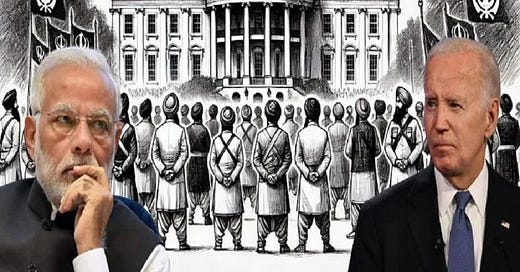Nothing will change for the better unless India does something to rebalance their relations.
Indian Prime Minister Modi’s trip to the US to attend the latest Quad leaders’ summit was marred by members of the National Security Council meeting with Khalistani-connected groups the day before his visit. America accused India last year of trying to assassinate a Delhi-designated terrorist-separatist with dual US citizenship on American soil. Their ties immediately worsened and remain troubled as a result of the US-backed regime change in Bangladesh. The Quad summit was supposed to improve them a bit.
What’s happening is a typical good cop, bad cop game in which some members of the American permanent military, intelligence, and diplomatic bureaucracies (“deep state”) behave friendly towards India in order to get its guard down while others stab it in the back. India’s rapid rise as a Great Power has accelerated multipolarity processes and hastened the end of unipolarity, which is why the US is resorting to such subterfuge in an attempt to control it, absent which the US will actively contain India.
India is in a difficult position because it’s not anti-Western, it’s just non-Western, and it requires more trade and investment with and from the West to continue fueling its economy. India also shares the US’ concerns about China’s rise, ergo their close military cooperation in this regard, but it’s also increasingly concerned about the US’ true intentions as revealed by the Khalistan issue and the Bangladeshi coup. Faced with this predicament, India chose to retain cordial ties, hoping that the US’ games will soon end.
They haven’t, though, and that’s becoming a problem as proven by the National Security Council cavorting with Khalistani separatists whose cause is considered by India to be a terrorist one. Few could have foreseen such a political provocation, which also dangerously implies that the American “deep state” is directly tied to this movement like some have previously speculated. It now appears as though there’s much more to this than meets the eye and that the US is using these groups to pressure India.
At the very least, it timed this meeting to coincide with the Quad leaders’ summit in order to send an unfriendly political message to India, thus undermining any chance of a rapprochement over this issue. Accordingly, India’s own “deep state” will now naturally suspect that Bangladesh and Khalistan are two sides of the same American coin for containing their country, which could further worsen their ties. Their policymakers will also now feel compelled to publicly signal in some way that this was unacceptable.
A diplomatic tit-for-tat could therefore play out unless India decides to exercise restraint, perhaps under the assumption that the US will change its ways, but the US has already made up its mind and will only double down on its good cop, bad cop game because there aren’t any costs. The direct complex interdependencies between them deter India from doing anything dramatic in order to not damage its own interests, yet the US has no such restraints because it considers itself to be the “senior partner”.
Unless India does something that rebalances their relations, nothing will change for the better in this regard since it’s only poised to get worse if the US isn’t soon put in check. To be clear, both countries benefit from their cooperation, which is why these scandals are so counterproductive. Their root cause is that the US takes these benefits for granted and has become greedy for more, thus explaining what it’s doing to India with Khalistan and Bangladesh, which suggests a trend towards more active containment.





India's assets as one of the pillars of a multipolar world include location and geography, size (population and market), and capabilities (technology and manufacture). For Modi's voters or voters of his party, it is important to improve the domestic economy and control the population growth. A stronger domestic economy would also help to lessen the dependence on exporting to the West. USA wants to control or manipulate India because of mostly its geolocation. As long as the Indian people love their country, Americans cannot take away that advantage. My 2-cent advice is do not hire anyone who graduated from the London Economics School.
"...the US’ true intentions as revealed by the Khalistan issue and the Bangladeshi coup."
Perhaps they might be wise to consider similarities between their 'Delhi-designated terrorist-separatist' and yet another colour revolution, so wilfully-longed for by the perpetrators, using crimes against humanity and perceived genocide against the Uyghur population as the pretext, however fanciful, for grounds. The thin edge of a wedge?
"...hoping that the US’ games will soon end."
What, you mean like a leopard might change its spots?
"It now appears as though there’s much more to this..."
Any colour you like (as long as we get to choose it)!
"...a trend towards more active containment."
Colours are SO old hat. What should we call the new-and-improved revolutions? How about an 'NGO revolution', 'Soros Revolution'; how about 'Woke Revolution'?